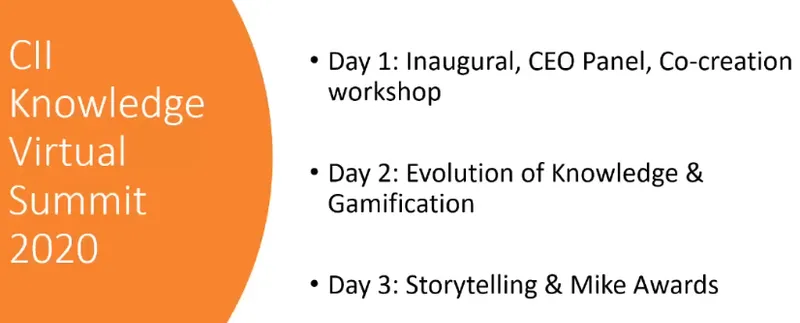Stay relevant, or be disrupted: CII Global Summit spotlights lifelong upgradation of knowledge and skills
CII’s annual Knowledge Summit featured a range of expert panels on AI evolution and management practices like gamification and storytelling. Here are some key takeaways.
The future of knowledge and work was discussed over three days at the recently-concluded CII Global Knowledge Virtual Summit 2020: Knowledge in the Age of Artificial Intelligence. This was the 15th edition of the annual summit, focussing on the evolution of the intelligent enterprise. It was also supported by the Knowledge Management Global Network (KMGN).

YourStory was the media partner for the summit in 2019 and 2020. See our article series which includes Knowledge Leadership, KM in the Age of AI, Gamification, Storytelling, Knowledge Sharing in the COVID-19 Era, and Eye on AI.
Originally scheduled to be held in Bengaluru in March this year, the summit had to be postponed due to the coronavirus pandemic. In a show of resilience and creativity, all sessions were moved online.
This year, the CII Knowledge Summit featured over 250 attendees joining on the virtual platform, with 40 speakers from 12 countries. In comparison, the ‘physical’ edition of the conference last year drew 175 attendees from seven countries.
While offline events offer unmatched opportunities for in-person networking and serendipitous interactions, online events have advantages with respect to global participation and reduced costs of travel and hospitality. This is a sign of things to come, and has important implications for those organising corporate and entertainment events – but that is another story.
In this article, we present key takeaways from the panels on CEO Insights, Evolution of Knowledge, Gamification, and Storytelling. In separate articles, we will cover case studies of winners of the MIKE awards (Most Innovative Knowledge Enterprise), who spoke on the concluding panel (see preview profiles of Tata Chemicals and Afcons Infrastructure).
YourStory moderated the panels on Business Storytelling: Organisational Communication in the Knowledge Era, and Knowledge Excellence: Winners of the Global MIKE awards.

The evolution of enterprise knowledge
Speakers from CGI, Wipro, AIQRATE, and NISG shared perspectives on knowledge evolution in a panel chaired by Ved Prakash, Chief Knowledge Officer of Trianz. “Knowledge in organisations has been in a constant state of evolution, keeping pace with industry and technology advancements,” he explained, in a chat with YourStory.
Ved charted the growth of knowledge management (KM) into four phases. “KM 1.0 was all about managing explicit knowledge in the form of documents. KM 2.0 brought in centricity of people and social networks, and expert systems and blogs became buzzwords,” he said.
“KM 3.0 was characterised by building context into the knowledge with the use of ontologies and semantic search becoming mainstream. KM 4.0 is the era of collective intelligence,” Ved added. This is driven by AI, ML, IoT, AR/VR, automation, blockchain, and other emerging technologies.
“These factors help knowledge play a bigger role in bringing out insights for decision making. We are operating more and more in a cyber-physical world where both humans and machines will co-exist in a seamless manner,” Ved explained.
Speakers on the panel identified the shift from content creation and structuring to making it usable. This calls for an ecosystem where each partner gainfully collaborates and increases efficiency.
AI should be seen not just as a technology but as a business strategy, and a key driver in creating augmented intelligence. AI and ML take decision-making to another dimension.
Though there are fears of automation displacing jobs, it is actually more about rebalancing human and machine work, with core tasks done by humans and lower order tasks by machines. Humans and machines will increasingly become co-workers, with mutual gains for productivity.
Mastery of knowledge about human behaviour is leading to the reimagining of customer experience, and creating better products and services. Customers and citizens are showing a growing preference for digital touchpoints, accelerated now by the COVID-19 pandemic.

It will take a combined human and machine capital strategy to increase digital acceptance among workforces and customers. The trust factor needs to be improved to educate stakeholders and get them to adapt to new digital investments.
The use case for blockchain is driven by the need for non-disputable and verifiable credentials in the form of certificates. This trust and collaboration will lead to stronger ecosystems and marketplaces, for which government policy will play a key role.
AI is driving a convergence of issues related to people, context and knowledge. Next-generation transformation tools need to be immersive, interactive and engaging, and connect directly to user experiences.
Businesses need to focus on impact metrics in this regard, beyond activity metrics. Professionals need to move up the learning curve, which calls for research, writing, and community validation. Stay relevant, or get ready to be disrupted, the panel summed up.

Gamification
Speakers from Standard Chartered Bank, L&T, TCS, Zenvis and TGC showcased the power of gamification for employee engagement, in a panel chaired by Rudolph D'Souza, Chief Knowledge Officer of Afcons Infrastructure. Gamification, the use of game elements in non-game contexts, is increasingly being adopted by businesses, Rudy explained.
Game elements include points, rules, challenge levels, badges, and the like. “Business results could be better employee productivity, customer satisfaction scores, and sales volumes. Successfully-designed gamification campaigns deliver RoI,” Rudy added.
Gamification works because, like storytelling, humans are hardwired for play. “It works well in organisations with multiple cultures, across education levels and generations,” he said. Gamification enhances employee engagement, and also becomes a tool for spotting talent in large organisations.
The panellists showed how gamification campaigns connected to the Indian Premier League for cricket became a “weapon of mass adoption”. Visualisation technologies for immersive reality (AR/VR) will open up new spaces for interacting digitally with the real world, beyond the space of 2D rectangular screens.
Combined with AI, XR (eXtended Reality) tools can improve visualisation of concepts and processes, and significantly improve the absorption of knowledge and skills. This, in turn, can improve workforce and operational efficiency.
In the long run, gamification can lead to transformational behaviour change which is tangible and sustainable. It is a combination of art and science, and digital platforms can help scale the effect.
Success factors include a dedicated focus on the user at the centre. Feedback, accomplishment, a sense of meaning, and a balance of anticipation and unpredictability are useful elements to follow (‘Principles of Octalysis’).
The panellists also highlighted the importance of gamification at a social or population level to encourage behaviours of safe distancing and hygiene in the times of coronavirus. Tools like apps, screens, and video analytics help in this regard.
The panel connected gamification to the theme of the conference by showing how personal analytics can be used to “nudge” employee behaviour in desired directions for permanent change. It can promote and reward more knowledge-sharing behaviours.
The speakers also cautioned against using gamification for manipulation, or saturation of gamification. Design elements like “winner takes it all” do not help employee morale. Rewards should not disproportionate to the effort. Care should be taken to avoid gamification rewards from becoming a “drug” – the results will fail once the rewards are removed.
In fact, gamification can work well even if there is no tangible reward. It can lead to cultural transformation as well in the process.
Storytelling
The storytelling panel moderated by YourStory featured speakers from Australia and India: Gabrielle Dolan (author, Stories for Work), Sejal Vora (author, Data Storytelling), and Ramya Ranganathan (management consultant and professor).
Storytelling helps in sensemaking and culture change or reinforcement. It adds a human and relatable element to communication, and adds interpretation to data. The safety industry has extensively used storytelling, particularly during a crisis.
Failure stories help build resilience and eventually shape leaders. Effective questioning, interviewing, and sharing techniques help in such contexts, along with expert facilitation.
Stories can improve employee engagement and also better understand customers. Data storytelling helps visualise underlying patterns and make better decisions. Companies should invest not just in surveys but in stories from stakeholders. Qualitative and quantitative approaches enhance each other in this regard, the panel recommended.
Stories should be short and to the point, with one key message. Stories need not always have an ending or a moral, thus leaving it open for interpretation and knowledge generation by the audience. Stories can also be interpreted at higher levels of narrative.
Knowledge and leadership
An online workshop was held during the conference, on Co-Creating Principles for Knowledge Success. Co-creation with ecosystems is a key emerging success factor for businesses, according to the workshop leaders from G-LINK in Russia: Sergey Voynov, Olga Smirnova and Vadim Shiryaev.
The first and last days of the conference also featured leadership addresses by speakers from industry, government and academia. They represented Tata Hitachi, Hong Kong Polytechnic University, INK, Indihood, MyGov, Bosch, Wells Fargo, MindTree, Knowledge Associates, Tata Memorial Library, Star India, 3M, and Government of Karnataka.
“The inaugural session underscored the sub-themes of the pandemic and the importance of storytelling as they relate to knowledge management. The inaugural speakers agreed that over the next decade, AI will automate and augment decisioning capabilities,” explained Gopichand Katragadda, Chairman, KM Summit 2020, and Founder and CEO at Myelin Foundry.
The inaugural speakers also discussed the importance of knowledge both for public and private good. “Platforms such as Aarogya Setu highlight the public good nature of knowledge creation and sharing,” he added.
Using AI and other KM tools for COVID-19 drug discovery by private entrepreneurs was discussed. “The speakers from CII and the Government emphasised their confidence in a strong India post the pandemic,” Gopichand said.
Industry keynotes addressed the need for knowledge access to alleviate poverty and the changing role of leaders in a knowledge-mesh based corporate environment. Across verticals, CEOs highlighted the importance of KM.
They showed how AI plays a critical role in automation and efficiency in engineering and manufacturing. “It was discussed that knowledge processes and people processes should be merged for the best outcomes, especially in service-based industries,” Gopichand added.
The media and entertainment industry leverages AI for recommendations in contexts where audience feedback may be limited. “It was acknowledged that for the academic world in India, the need of the hour is to collect better data and use KM tools along with AI for benchmarking and improvement,” he observed.
“Given that long-term evolution of knowledge leveraging technologies such as AI is important and inevitable, the core principles of knowledge creation and management remain enduring,” Gopichand summed up.
Edited by Saheli Sen Gupta









